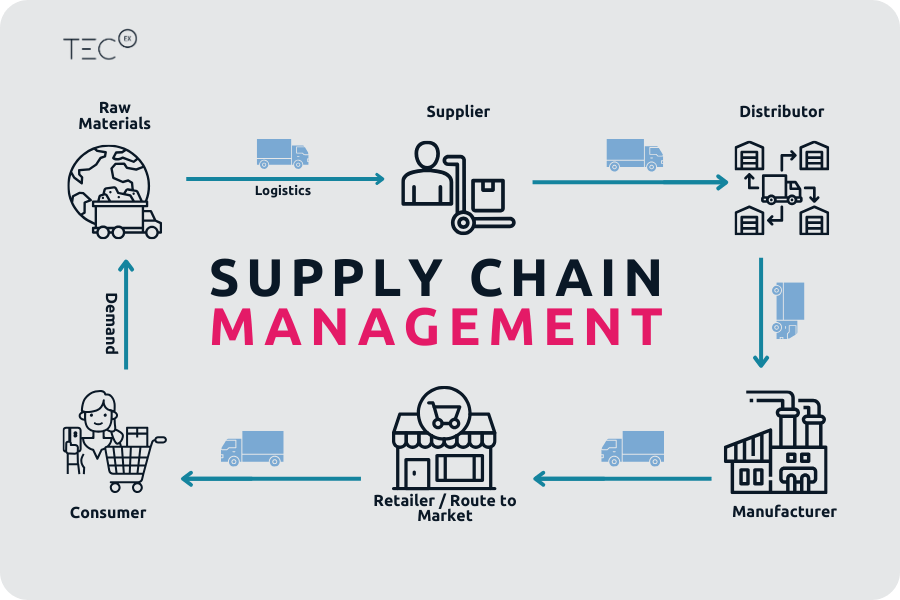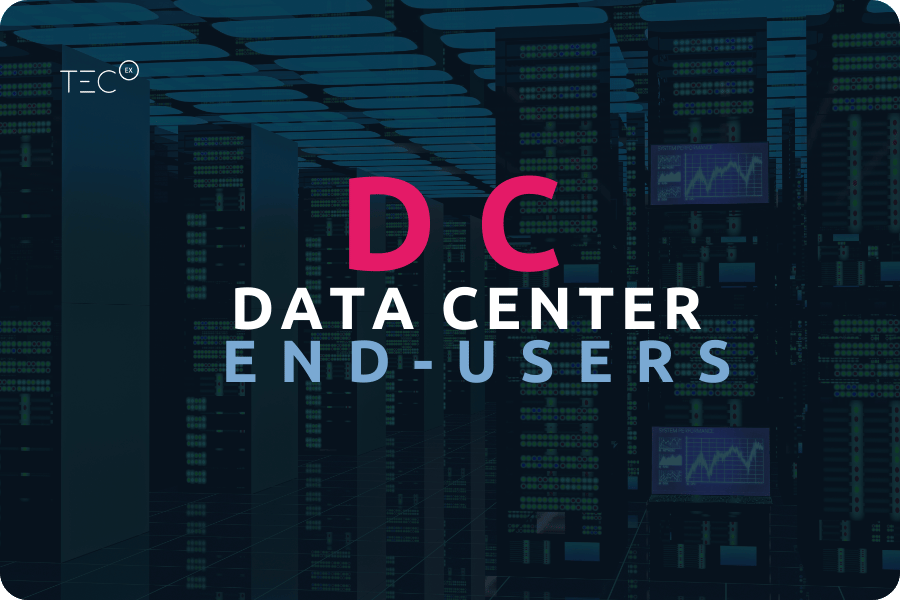In today’s fast-paced global economy, effective supply chain management (SCM) is more critical than ever, especially for technology companies striving to maintain a competitive edge. As businesses expand their operations across borders, they encounter many challenges, from complex regulations to fluctuating demand. Understanding the nuances of SCM helps you streamline your logistics and enhances your ability to deliver products efficiently and reliably.
Delve into supply chain management and how it can strategically mitigate risks, reduce costs, and ultimately drive customer satisfaction. Explore specific use cases for client types—Value-Added Resellers (VARs), Original Equipment Manufacturers (OEMs), and data center end users.
What is Supply Chain Management?
Supply chain management (SCM) refers to the systematic oversight of the flow of goods and services, from the initial stages of raw material procurement to the final delivery to the consumer. It encompasses a multitude of activities, including sourcing, production, logistics, and distribution. Effective SCM not only improves operational efficiency but also plays a crucial role in enhancing customer satisfaction and reducing costs.

The Role of Logistics in Supply Chain Management
Logistics serves as the backbone of supply chain management. It involves the planning, implementing, and controlling the movement and storage of goods and services. The primary goal of logistics is to ensure that products are delivered to the right place, at the right time, and in the proper condition.
Key functions of logistics within SCM include:

Transportation Management
Selecting the most efficient and cost-effective shipping methods.

Order Fulfillment
Coordinating the steps in getting a product from order placement to delivery.
When logistics are managed effectively, you can significantly reduce costs, improve delivery times, and enhance overall customer satisfaction. Well-managed logistics can lead to stronger brand loyalty and repeat business.
Why Supply Chain Management Matters for Tech Companies
Businesses increasingly rely on global supply chains in today’s interconnected world. As a result, understanding SCM has become vital for companies, particularly in the technology sector.
For technology companies, effective supply chain management is not just beneficial; it is essential. The tech industry is characterized by rapid innovation, changing consumer preferences, and fierce competition. To remain competitive, tech companies must ensure timely access to components, products, and services. SCM is particularly crucial for tech firms because of the following:
Speed to Market:
Technology products have short lifecycles. Effective SCM ensures that products reach the market quickly, maximizing sales potential and allowing companies to stay ahead of trends.
Risk Mitigation:
Global supply chains are susceptible to various risks, including geopolitical tensions, regulatory changes, and natural disasters. Effective SCM strategies help identify and mitigate these risks, enabling companies to adapt quickly.
Cost Efficiency:
Streamlined supply chains reduce overhead costs, allowing technology companies to invest in innovation and research. Companies that effectively manage their supply chains often have better profit margins.
Use Cases | How Different Client Types Benefit from Supply Chain Management
Understanding how different client types can leverage supply chain management is essential for tailoring strategies that meet their specific needs.
Value-Added Resellers (VARs)
Value-Added Resellers often face challenges related to procurement and distribution. They require a flexible supply chain that can adapt to customer needs. Effective SCM enables VARs to:
- Optimize Procurement: VARs can negotiate better rates and reduce lead times by consolidating purchasing processes. For example, a VAR could centralize sourcing for multiple projects, leading to bulk purchasing discounts.
- Enhance Distribution: Tailored tech logistics solutions allow VARs to deliver products to clients quickly, improving service levels. Implementing advanced inventory systems can help VARs anticipate demand more accurately.
.png)
We specialize in providing VARs with central procurement solutions and global access to products, ensuring they can meet diverse customer demands seamlessly.
Original Equipment Manufacturers (OEMs)
OEMs encounter unique challenges, such as managing returns and handling temporary imports. With our expertise in Return Merchandise Authorization (RMA) and efficient import processes, OEMs can:
- Streamline Returns: Implementing effective RMA processes can reduce costs and improve customer satisfaction. Establishing a clear returns policy, for example, can simplify the return process for customers.
- Facilitate Temporary Imports: Our logistics solutions help OEMs import equipment temporarily without complex distributor arrangements, enabling them to meet project deadlines without delay.
.png)
By working with TecEx, OEMs can navigate the complexities of international logistics, ensuring smooth operations and compliance with regulations.
End Users with Data Center Focus
For organizations operating data centers, avoiding import risks is crucial. Logistics solutions tailored for data centers ensure:
- Direct Deliveries: Our complete DDP solution can deliver gear, such as high-value servers, directly to data centers. With us acting as your Importer of Record (IOR), this direct approach minimizes potential delays due to customs or documentation issues.
- Risk Reduction: Our expertise helps data centers navigate compliance and logistics, minimizing potential delays, and allowing for greater visibility throughout the shipping process.

By focusing on seamless logistics, we empower data centers to operate efficiently and ensure they can meet their operational demands without complications.
Overcoming Common Supply Chain Challenges
Despite its importance, effective supply chain management is fraught with challenges. Common issues include:

Regulatory Compliance:
Navigating complex regulations can be daunting. Companies must comply with local and international laws to avoid fines and shipping delays.

Customs Delays:
Unexpected customs issues can lead to stuck shipments or seizures, impacting delivery schedules and customer satisfaction.

Supply Chain Visibility:
Lack of transparency can hinder decision-making and response times during disruptions. Without adequate visibility, it becomes challenging to manage inventory levels effectively.
To overcome these challenges, businesses must implement robust SCM strategies, including risk assessment, regular audits, and advanced technology solutions for real-time tracking and data analytics. Using predictive analytics can also help businesses anticipate supply chain disruptions before they occur.
How We Can Help with Global Supply Chain Management
Navigating the complexities of global supply chain management requires expertise. Our company specializes in assisting tech firms with:
Compliance Management
We help clients understand and meet regulatory requirements in over 200 countries and territories, minimizing risks associated with non-compliance.
Logistics Solutions
Our strategic logistics partners streamline transportation and warehousing, ensuring timely deliveries. We leverage advanced technology to optimize routes and reduce shipping times.
Risk Management
By identifying potential risks in the supply chain, we provide strategies to mitigate disruptions. Our team conducts regular risk assessments and develops contingency plans tailored to our clients’ needs.
Partnering with us allows companies across various tech and global industries to focus on their core operations while we handle the intricacies of global logistics compliance. Our deep industry knowledge and proven import and export methodologies ensure your supply chain is resilient and efficient.
Supply Chain Management FAQs
What is supply chain management?
Supply chain management involves overseeing the flow of goods and services from origin to consumer, including procurement, logistics, and distribution.
Why is logistics important in SCM?
Logistics ensures the efficient movement of goods, reduces costs, and enhances customer satisfaction.
How can I improve my supply chain?
Evaluate your logistics strategies, work with compliance experts like TecEx, and consider leveraging technology for better visibility.


